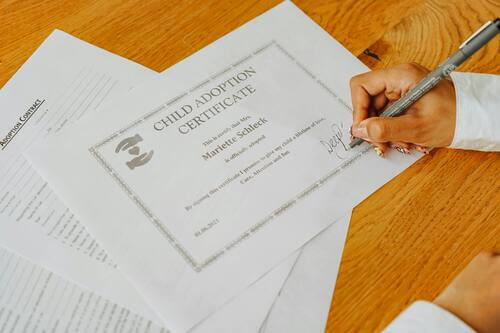Adoption Revocation: Can Birth Parents Change Their Mind?
Adoption is one of the most life-changing decisions anyone can make — for the birth parents, the adoptive parents, and of course, the child at the heart of it all. As the adoptive parent, you will need to make yourself truly aware of "adoption revocation".

Be sure to know everything that there is to know about the process. Ask questions such as, “Can a birth parent change their mind after placing their baby for adoption?” Or, “What rights do we have if that happens?”
This guide will walk you through adoption revocation, what it means, how it works, and how you can prepare for the possibility.
Whether you’re a birth parent weighing this life-altering decision, or hopeful adoptive parents waiting for your family to grow, understanding this process can help you feel more informed and supported.
What Does “Adoption Revocation” Mean?
Adoption revocation is the legal term for when a birth parent withdraws (or “revokes”) their consent to an adoption after initially signing the papers.
In other words, a birth parent who signs legal consent to place a child for adoption may be able to change their mind within a certain window of time — known as the revocation period — depending on the laws where you live.
The Process of Before & After Birth: When Does Consent Become Final?
One of the most confusing parts of adoption is knowing when a birth parent’s decision is final. Here’s a breakdown:
Before birth:
Most adoption plans are made while the birth mother is pregnant. The birth parents choose the adoptive family, make arrangements, and may even sign paperwork expressing their intent to place the child.
However, in most places, any documents signed before the baby is born are not legally binding. A birth parent can change their mind at any point during pregnancy — they have the full right to parent the child when born.
After birth:
Once the baby is born, the birth parents must sign official consent papers — these are the legal documents that terminate parental rights. Only after these papers are signed and the revocation period passes does the adoptive family’s parental rights become permanent.
Revocation period:
This is the crucial window when birth parents can change their mind. It varies widely by state:
- Some states allow 48–72 hours.
- Some allow up to 30 days.
- Others say the consent is final as soon as it’s signed (although this is less common).
Examples of Revocation Periods
Here are a few examples (always double-check local laws!):
- California: Birth parents usually have 30 days to revoke consent unless they sign a waiver.
- Texas: Consent becomes irrevocable after it’s signed and filed with the court — no grace period.
- Florida: Consent is generally irrevocable after it’s signed, except in cases of fraud or duress.
Why Is There a Revocation Period?
This window exists to protect everyone — especially the birth parent and child. The law recognizes that choosing adoption is one of the most emotional and serious decisions a person can make. The revocation period gives the birth parents a final chance to make sure it’s truly what they want.

What Rights Do Adopting Parents Have During Revocation?
This can be one of the hardest parts for hopeful adoptive parents to hear: until the birth parents’ rights are legally and finally terminated, adoptive parents do not have full parental rights.
They may have:
- Temporary custody or physical care.
- The right to be present at the birth or hospital discharge (if agreed).
But legally, the birth parents still hold parental rights until the adoption is finalized. If a birth parent revokes consent within the legal window, the adoptive parents generally must return the child — no matter how emotionally painful that is.
After the Revocation Period Ends
When the revocation period expires and the adoption is finalized by the court, the birth parents’ rights are permanently terminated. At that point:
- The child becomes the legal child of the adoptive parents.
- The birth parents cannot change their mind.
- The adoption can only be undone in extremely rare cases — like fraud, coercion, or procedural mistakes.
- This includes foster care adoption.
How Common Are Adoption Disruptions?
An “adoption disruption” is when an adoption plan doesn’t go through before finalization. This can happen if a birth parent changes their mind before or during the revocation period.
Studies suggest that about 10-25% of domestic infant adoptions experience some form of disruption. It’s painful for both families, but it’s a reality of honoring everyone’s rights — especially the birth parents’ right to make a fully informed choice.
How to Prepare Emotionally
Whether you’re a birth parent or adoptive parent, this can feel scary. Here’s how you can prepare and protect your heart:
1. If you’re a birth parent:
- Be honest with yourself and your support team.
- Take the time you need to be 100% sure.
- Remember, you have the right to change your mind within your legal window.
2. If you’re an adoptive parent:
- Work with an experienced adoption agency or attorney who clearly explains your rights.
- Have emotional support in place — adoption is a journey with highs and lows.
- Know that if a disruption happens, it’s not your fault. You gave your love and hope wholeheartedly.
Can Birth Parents Get Their Rights Back After Finalization?
This is extremely rare. Once the court legally terminates parental rights and the adoption is finalized, birth parents typically cannot get their rights reinstated. Only cases of proven fraud, coercion, or serious legal errors may be reopened.
Courts prioritize the child’s best interests, which usually means maintaining stability in their new family.
Practical Steps for a Smooth Adoption
For Birth Parents:
- Talk with a licensed counselor or social worker.
- Understand exactly when your consent becomes final.
- Don’t sign anything until you’re truly ready.

For Adoptive Parents:
- Work with a licensed agency or attorney. They’ll help ensure every step is done correctly and ethically — and that you understand your rights and risks.
- Respect the birth parents’ legal rights. Until their rights are fully and finally terminated, the decision is still theirs.
- Prepare emotionally. It’s normal to feel protective and excited about your future family — but remember that adoption is a major life decision for the birth parents, too.
- Get support. Adoption is a beautiful and complicated journey — don’t do it alone. Talk with your agency, lawyer, or counselor if you’re feeling worried about this possibility.
When to Get Legal Help
Adoption laws vary depending where you live — so if you’re asking “Can a birth parent change their mind?” the only way to know for sure is to talk with an experienced family law or adoption attorney in your area. They can walk you through your rights, risks, and how to protect everyone involved.
Adoption is as much of a miracle as conceiving your own child, but it’s not simple. It’s okay to feel scared or overwhelmed — it just means you care deeply.
Knowing how adoption revocation works helps you respect everyone’s rights, plan realistically, and keep the child’s well-being at the center.
If you’d like more guidance on “what are parental rights”, how to protect your parental rights, or termination of parental rights process, be sure to read the full guides at any one of the trusted international links. The more you know, the more confident and prepared you’ll feel.
Final Tip: “Always, always speak to a local family lawyer for accurate advice — child protection and parental rights law can be complex and life-changing.”
This article is for general informational purposes and is not legal advice. Always consult a licensed adoption attorney in your state for help with your specific situation.


























New! Comments
Have your say about what you just read! Leave me a comment in the box below.